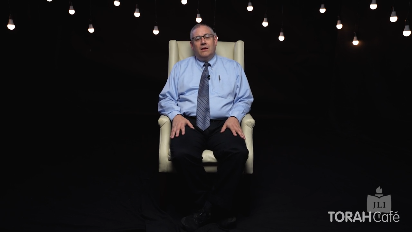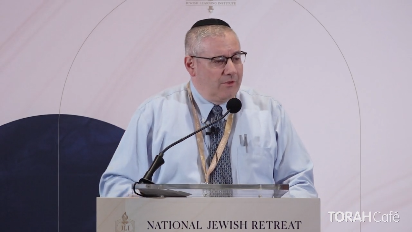-
Jewish Doctor Discusses Abortion, Organ Donation and Vaccination (20:35)
Rabbi Dr. Edward Reichman gives us a fascinating tour of some of the most challenging medical dilemmas, including abortion, vaccination, and organ donation. With a unique background in Jewish law and medicine, he takes us through his real-life experiences in dealing with the sacredness and sensitives of human life.
Rabbi Dr. Edward Reichman (51)
-
Monarchs, Measles, and Mitochondria: A Medical Historical Journey (52:36)
What do Shakespeare, philosopher Jeremy Bentham and English kings Henry IV, Richard III, and Henry VIII all have in common? Join this breathtaking historical tour of museums, monarchs, murder mysteries, and mummies as we explore their relationship to Jewish medical history throughout the centuries. This lecture was delivered at the 16th annual National Jewish Retreat
Rabbi Dr. Edward Reichman (51)
-
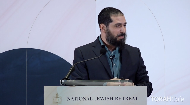 52:52
52:52
When Caregivers and Care Recipients Clash (52:52)
A Jewish military chaplain shares lessons learned from mass casualty events and his family's complex medical journey about the intersection of two sets of incentives. This lecture was delivered at the 16th annual National Jewish Retreat. For more information and to register for the next retreat, visit: Jretreat.com.
Rabbi Elie Estrin (5)
-
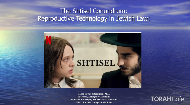 44:42
44:42
The Shtisel Conundrum: Reproductive Dilemmas of the Fictional Shtisel Family (44:42)
In this interactive session, we follow the travails of the young couple Ruchami and Chanina from the Netflix series Shtisel (season three), as they navigate the challenges of medicine and assisted reproductive technologies. We will explore the ethics of abortion, contraception, surrogate motherhood, and risking one’s life to have children
Rabbi Dr. Edward Reichman (51)
-
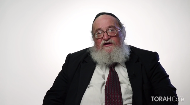 11:43
11:43
The Jewish Position on Physician Assisted Suicide (11:43)
Rabbi Dr. Yitzchok Breitowitz (71)
-
 52:36
52:36
Jewish Medical Ethics Book Club: Inheritance (52:36)
In this interactive session, we will use Dani Shapiro’s memoir to discuss genetic testing and its impact on Jewish law. Case studies include of artificial insemination, bastardy, releasing women to remarry, inheritance, solving “cold cases” and identifying lost relatives. (NOTE: One need not have read the book to attend
Rabbi Dr. Edward Reichman (51)
-
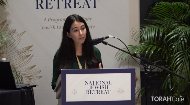 33:58
33:58
JScreen: Genetic Testing in Jewish Community (33:58)
Learn about the latest advances, out of Emory University, to end Jewish Genetic Diseases. As a community, what can we do to help our friends and family? This lecture was delivered at the 14th annual National Jewish Retreat. For more information and to register for the next retreat, visit: Jretreat.com.
Hillary Regelman (1)
-
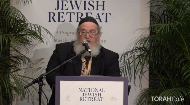 46:49
46:49
Stem Cell Research and Jewish Law (46:49)
Are we merely the sum of our parts? How does Jewish law consider the ethical and legal issues posed by recent developments in biological technology?? This lecture was delivered at the 14th annual National Jewish Retreat. For more information and to register for the next retreat, visit: Jretreat.com.
Rabbi Dr. Yitzchok Breitowitz (71)
-
 39:39
39:39
Medical Ethics Roundtable (39:39)
As a patient or caretaker, have you ever encountered Jewish medical ethics questions for which you did not have the answers? To find the answers you need, ask a panel of rabbis and doctors. This sesssion was featured at the 14th annual National Jewish Retreat. For more information and to register for the next retreat, visit: Jretreat.com.
Rabbi Dr. Edward Reichman (51)
-
 55:47
55:47
When Man Makes Man (55:47)
A cover article of Time Magazine this year, entitled “The Future of Babies,” addressed reproductive technology, including gene editing, uterus transplantation and the three-parent embryo. We will discuss these remarkable advances from a Jewish perspective. This lecture was delivered at the 14th annual National Jewish Retreat
Rabbi Dr. Edward Reichman (51)
-
 50:01
50:01
Jewish Medical Ethics Update 2018 (50:01)
In this annual lecture, we will analyze the Jewish legal ramifications of the latest advances and stories from the world of medicine. From genetics to gene editing, to mitochondrial DNA, to transplanting animal organs, to questioning the very definition of death itself, prepare to be astounded at the pace of change. This lecture was delivered at the 13th annual National Jewish Retreat
Rabbi Dr. Edward Reichman (51)
-
 56:30
56:30
Medical Roundtable (56:30)
As a patient or caretaker, have you ever encountered Jewish medical ethics questions you did not have the answer for? To find the answers you need, ask a panel of rabbis and doctors. This lecture was delivered at the 13th annual National Jewish Retreat. For more information and to register for the next retreat, visit: Jretreat.com.
Rabbi Dr. Edward Reichman (51)
-
 44:43
44:43
Ethics of Tuberculosis Treatment (1993) (44:43)
What takes precedence, the rights of the individual or the safety of the community? Rabbi Herbert Bomzer tackles the question of whether compulsory medical treatment for tuberculosis is ethical from a Jewish perspective. This presentation took place in 1993 at the International Conference on Judaism and Contemporary Medicine. The video recording is courtesy of Dr
Rabbi Herbert Bomzer (2)
-
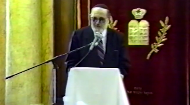 44:56
44:56
How Judaism Approaches Medical Malpractice (1993) (44:56)
What does Judaism say on the subject of medical malpractice? This presentation took place in 1993 at the International Conference on Judaism and Contemporary Medicine. The video recording is courtesy of Dr. Michael-Moshe Akerman M.D. who is the director of the conference.
Rabbi Herbert Bomzer (2)
-
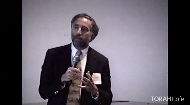 1:16:20
1:16:20
A General Discussion on Reproductive Technologies (1997) (1:16:20)
This presentation discusses complex medical issues. The views and opinions expressed here represent only those of the speaker and not that of Torah Café or the organizers of the conference. For the practical application of Torah views in individual cases please consult a Rabbi and Halachic authority who specializes in Jewish medical case law
Dr. Richard Grazi (1)
-
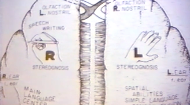 52:53
52:53
Mind, Brain and Soul Questions My Students Have Asked Me (1993) (52:53)
Can the mind have multiple instances of consciousness? What’s the connection between Chabad Chassidism and the various parts of the brain? And do spiritual and scientific beliefs contradict each other? This is a vintage video and is being shared here for its historical value and its content, not for the quality of its video
Rabbi Dr. Yaakov Brawer (6)
-
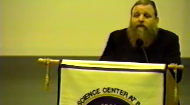 35:29
35:29
Insights on Euthanasia (1993) (35:29)
What makes life worth living? Is it youth, wealth, family, health, or one's job? Actually it's none of these. The inability to define somethings of value isn’t because its value is lacking, but rather because its value is inherent and beyond definition. This presentation took place in 1993 at the International Conference on Judaism and Contemporary Medicine
Rabbi Sholom Ber Wineberg (5)
-
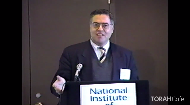 52:32
52:32
Ethics of Practice Guidelines (1997) (52:32)
What are the practiced guidlines for doctors to abide by, and where do they come from? This presentation took place in 1997 at the International Conference on Judaism and Contemporary Medicine. The video recording is courtesy of Dr. Michael-Moshe Akerman M.D. who is the director of the conference. This presentation discusses complex medical issues
Dr. Lawrence Resnick (1)
-
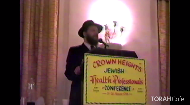 1:14:25
1:14:25
Healthy Mind, Healthy Body (1988) (1:14:25)
What is the Jewish perspective of the "Healthy Mind, Healthy Body" connection? Are they at odds with each other, or are they interconnrected? This presentation took place in 1988 at the International Conference on Judaism and Contemporary Medicine. The video recording is courtesy of Dr. Michael-Moshe Akerman M.D. who is the director of the conference.
Rabbi Dr. J. Immanuel Schochet (34)
-
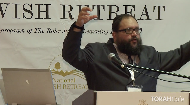 1:02:05
1:02:05
Who Shall Live and Who Shall Die (1:02:05)
At the dawn of his career, a doctor takes on the most important pledge of his life—to protect human life as much as possible. But what happens when that day comes and he or she has only enough medication for one patient? What is the Jewish approach to such excruciating questions? This lecture took place at the 12th annual National Jewish Retreat
Rabbi Shlomo Yaffe (68)
-
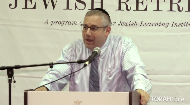 1:03:02
1:03:02
Medical Halachah Update 2017 (1:03:02)
Since last year’s Retreat there have been a number of significant advances in science and medicine. In this session, we discuss the very latest developments spanning the gamut of life, including mitochondrial transfer; artificial wombs; and new developments in Zika, xenotransplantation, and virtopsy. This lecture took place at the 12th annual National Jewish Retreat
Rabbi Dr. Edward Reichman (51)
-
 55:23
55:23
Global Freezing: Cryopreservation in Jewish Law (55:23)
The ability to freeze or cryopreserve parts of the human body has impacted areas of medicine from fertility preservation, to organ transplantation, to post-trauma resuscitation. The manifold impact of this global freezing, for the observant Jew, will be explored in this lecture. Warning: After this lecture you may never look at frozen kugel the same way
Rabbi Dr. Edward Reichman (51)
-
 51:59
51:59
Medical Crossfire! (2017) (51:59)
Your questions, three panelists, and 60 seconds to give an answer. This fast-paced session features pressing questions on Jewish medical ethics. This panel was featured at the 12th annual National Jewish Retreat. For more information and to register for the next retreat, visit: Jretreat.com.
Series: Crossfire!
Rabbi Dr. Edward Reichman (51)
-
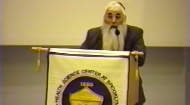 44:59
44:59
Patient Dignity: Insights Into Patient Care and Attitudes (1993) (44:59)
This is a vintage video and is being shared here for its historical value and its content, not for the quality of its video. This presentation took place in 1993 at the International Conference on Judaism and Contemporary Medicine. The video recording is courtesy of Dr. Michael-Moshe Akerman M.D. who is the director of the conference
Dr. Yisroel Suskind (2)
-
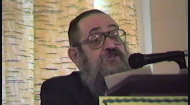 1:34:29
1:34:29
Halachic Discussion on Medical Questions (1988) (1:34:29)
Rabbi Zelig Sharfstein will discuss some contemporary medical questions that have arisen what Jewish Law has to say about them. This is a vintage video and is being shared here for its historical value and its content, not for the quality of its video. This presentation took place in 1988 at the International Conference on Judaism and Contemporary Medicine
Rabbi Zelig Sharfstein (1)
-
 35:26
35:26
How to Approach Medical Ethics (1999) (35:26)
This is a vintage video and is being shared here for its historical value and its content, not for the quality of its video. This presentation took place in 1999 at the International Conference on Judaism and Contemporary Medicine. The video recording is courtesy of Dr. Michael-Moshe Akerman M.D. who is the director of the conference.
Professor Avraham Steinberg (7)
-
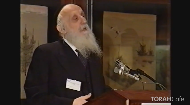 1:19:31
1:19:31
The Doctor Patient Relationship (1999) (1:19:31)
Rabbi Dr. Twerski will discuss the personal touch that the relationship between a doctor and their patient had years ago versus how it is today. He will also discuss what medical information one may discloss for the purposes of Shiduchim. This is a vintage video and is being shared here for its historical value and its content, not for the quality of its video
Rabbi Dr. Abraham J. Twerski (16)
-
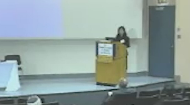 1:05:48
1:05:48
Assisted Reproductive Technology (2002) (1:05:48)
When IVF is used to create a pregnancy, who is the real mother? How do we ensure that the donated sperm doesn’t get mixed up with someone else’s? And is donating sperm always permitted, or does it violate the prohibition of “Motzei Zera L’Vatalah”? This is a vintage video and is being shared here for its historical value and its content, not for the quality of its video
Dr. Susan Lobel (2)
-
 1:07:39
1:07:39
Bioterrorisim: Triage of Resources (2002) (1:07:39)
Can mandatory vaccination be objected to? Who gets a vaccine first if there isn’t enough for everyone? And can a vaccine be used if a tiny fraction of recipients will die from it? This is a vintage video and is being shared here for its historical value and its content, not for the quality of its video
Dr. Aaron Bennett (1)
-
 52:14
52:14
The Difference Between Jewish and Secular Medical Ethics (1999) (52:14)
This is a vintage video and is being shared here for its historical value and its content, not for the quality of its video. This presentation took place in 1999 at the International Conference on Judaism and Contemporary Medicine. The video recording is courtesy of Dr. Michael-Moshe Akerman M.D. who is the director of the conference
Dr. John C. LaRosa (1)
-
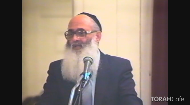 1:13:52
1:13:52
Care of the Terminally Ill (1992) (1:13:52)
Is euthinasia permitted in any circumstances? This is a vintage video and is being shared here for its historical value and its content, not for the quality of its video. This presentation took place in 1992 at the International Conference on Judaism and Contemporary Medicine. The video recording is courtesy of Dr. Michael-Moshe Akerman M.D
Rabbi Dr. Abraham S. Abraham (1)
-
 1:18:19
1:18:19
End of Life Issues (2002) (1:18:19)
What is a doctor’s obligation for a patient who is dying? What procedure may or may not be administered? Does a patient who’s brain dead require medical care? Also, discover the benefits of appointing a healthcare proxy, and join Dr. Powderly in her experience as a member of multiple Ethics Committees
Dr. Kathleen E. Powderly (3)
-
 1:34:12
1:34:12
Embryo and Stem Cell Research (2002) (1:34:12)
How does Jewish law look at embryonic stem cell research? This is a vintage video and is being shared here for its historical value and its content, not for the quality of its video. This presentation took place in 2002 at the International Conference on Judaism and Contemporary Medicine. The video recording is courtesy of Dr. Michael-Moshe Akerman M.D
Dr. Miriam H. Feuerman (2)
-
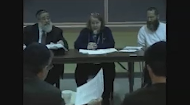 1:24:32
1:24:32
Ethical Pediatric Care (2002) (1:24:32)
Should every effort be made to save a baby even if it will have neurological and cognitive defects, and a poor quality of life? Is abortion ever permitted? Are we ever allowed to take someone off life support? This is a vintage video and is being shared here for its historical value and its content, not for the quality of its video
Dr. Kathleen E. Powderly (3)
-
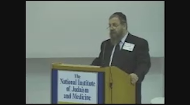 1:06:05
1:06:05
Human Genome Editing, Paradoxes, and Mind-Body Perspectives (2002) (1:06:05)
Is human genome editing ethical? How do we deal with the ubiquities paradoxes in life and religion? And, can we effect celestial events that determine our fate? This is a vintage video and is being shared here for its historical value and its content, not for the quality of its video
Professor Robert Pollack (1)
-
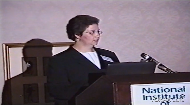 1:13:05
1:13:05
Cloning Issues (1999) (1:13:05)
What are the ethical problems with human cloning? Is a cloned person unique or just a copy of someone else? Is it even considered a human being? May we use cloning to enhance a person’s physical capabilities? Are we “playing God” by doing gene therapy? This is a vintage video and is being shared here for its historical value and its content, not for the quality of its video
Dr. Miriam H. Feuerman (2)
-
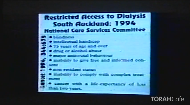 55:26
55:26
Kidneys For Sale: Rationing Renal Therapy (1996) (55:26)
Is it fair for the rich to have the most access to organ transplants? What if a treatment is too expensive, not covered by insureances, or dictated to be done a certain way by the insurance? Should a CEO make a higher salery if his medical insurance isn't making money? And is the dialisys machine allowed to be removed under any circumstances? This is a vintage video and is being shared here for its historical value and its content, not for the quality of its video
Dr. Eli Friedman (2)
-
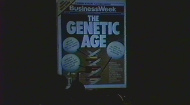 1:04:02
1:04:02
Genetic Engineering: Screening for Breast Cancer (1996) (1:04:02)
Should one undergo genetic testing to detect if they have a cancer gene? Perhaps it’s better not to know since not much can be done? This is a big ethical dilemma with reasons on both sides of the argument. This is a vintage video and is being shared here for its historical value and its content, not for the quality of its video
Dr. Harvey Stern (1)
-
 46:22
46:22
Caring for the Uninsured (1999) (46:22)
What are the ramifications of having many people who are uninsured, and what are solutions for that? This is a vintage video and is being shared here for its historical value and its content, not for the quality of its video. This presentation took place in 1999 at the International Conference on Judaism and Contemporary Medicine. The video recording is courtesy of Dr
Dr. Benjamin Safirstein (1)
-
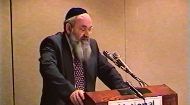 1:07:40
1:07:40
Medical Student Forum (1999) (1:07:40)
Proffesor Avraham Steinberg gives answers to various questions from medical students, from violating the Shabbat for the sake of one's life, to paitient confidentiality issues, and more. This is a vintage video and is being shared here for its historical value and its content, not for the quality of its video
Professor Avraham Steinberg (7)
-
 1:11:47
1:11:47
Nuclear Biological and Chemical Terrorism (2005) (1:11:47)
Dirty bombs are quite scary. But with the citizens properly informed, we can - in certain ways - take the "terror" out of chemical terrorism. In this video, we primarily take a look at the ethical and moral issues surrounding triage, and how we generally reconcile them according to Jewish law
Dr. Angelo Aquista (1)
-
 1:04:34
1:04:34
Gender Selection Through IVF (2005) (1:04:34)
There are three basic reasons for gender selection when conducting In Vitro Fertilization. In this video, we analyze the different methodologies involved. The Halachic and ethical ramifications of IVF and gender selection - as well as the definition of the Torah commandment to "Be fruitful and multiply" - are addressed, citing sources from the Talmud and Jewish law
Dr. Adena K. Berkowitz (1)
-
 59:03
59:03
Top Bioethics Questions of 2016 (59:03)
This session will address the Jewish legal ramifications of the extraordinary advances and news items in medicine during the past year. Topics will include animal rights, gene editing, advances in organ transplantation, reproductive organ and genital transplants, and advances in epigenetic research. This lecture took place at the 11th annual National Jewish Retreat
Rabbi Dr. Edward Reichman (51)
-
 59:33
59:33
Medical Crossfire! (2016) (59:33)
The panelists will answer questions and address medically related ethical quandaries submitted by participants. No question is too basic or too complex. To see our other "Crossfire!" videos, click here. This panel was featured at the 11th annual National Jewish Retreat. For more information and to register for the next retreat, visit: Jretreat.com.
Series: Crossfire!
Rabbi Berel Bell (151)
-
 55:23
55:23
Good-bye Ebola, Hello Zika: Jewish Legal Ramifications (55:23)
Last year, the Zika virus was virtually unknown to most of the world. Today, it is a major global health concern, threatening the cancellation of the Olympics
Rabbi Dr. Edward Reichman (51)
-
 44:46
44:46
Transplantation Issues: Who Should Be the Recipient? (2005) (44:46)
Are we obligated to provide organ transplants for people who don't have that much longer to live? Is taking an organ from a child allowed? And should there be a market for organs? This is a vintage video and is being shared here for its historical value and its content, not for the quality of its video
Dr. Amy L. Friedman (1)
-
 1:11:37
1:11:37
Medical Ethics: Student Open Forum (2005) (1:11:37)
This is a vintage video and is being shared here for its historical value and its content, not for the quality of its video. This presentation took place at the International Conference on Judaism and Contemporary Medicine on May 15th 2005, at the Hilton Hotel in New York City. The video recording is courtesy of Dr. Michael-Moshe Akerman M.D
Dr. Velvl Greene (2)
-
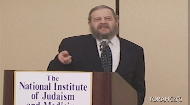 1:29:48
1:29:48
End of Life Issues (2005) (1:29:48)
Can someone who is suffering be taken off life support under any circumstances? This is a vintage video and is being shared here for its historical value and its content, not for the quality of its video. This presentation took place at the International Conference on Judaism and Contemporary Medicine on May 15th 2005, at the Hilton Hotel in New York City
Dr. Kathleen E. Powderly (3)
-
 55:28
55:28
Harvesting Organs from Clones (55:28)
Using the bestseller, Never Let Me Go by Kazuo Ishigura, as a catalyst for discussion, this session will address issues including the permissibility of cloning, the legal status of a clone, and the legal ramifications of sacrificing one person to save another. It is not required to read the book for this session. This lecture took place at the 11th annual National Jewish Retreat
Rabbi Dr. Edward Reichman (51)
-
 1:16:25
1:16:25
Healthy Lifestyle Choices (2005) (1:16:25)
Can healthy lifestyle choices be mandated on individuals who engage in unhealthy habits? Can someone be stopped from doing something that will create a burden on the community? Are we free to do with our bodies as we see fit even if it will be harmed by our behaviors? And does Judaism have anything to say about one’s obligation towards the wellbeing and maintenance of his body? This is a vintage video and is being shared here for its historical value and its content, not for the quality of its video
Dr. Alfred Sofer (2)
-
 1:20:00
1:20:00
Caring For the Uninsured (2005) (1:20:00)
Are doctors required to treat patients who can’t afford to pay for the care? What obligations does the society have towards caring for it’s sick and needy? And what is the Jewish approach and view to this? This is a vintage video and is being shared here for its historical value and its content, not for the quality of its video
Dr. Robert Jacobs (1)
-
 44:43
44:43
Jewish Medical Ethics update 2015 (44:43)
Science in the 21st century is progressing at a dizzying pace. In this session we will discuss up-to-the-minute advances and news in the world of medicine and examine them in a Jewish legal context. Topics will include genetic testing and engineering, new frontiers in prenatal testing, organ transplantation after cardiac death, 3-D printing of organs and body parts, and head transplants
Rabbi Dr. Edward Reichman (51)
-
 1:04:42
1:04:42
6. The Uterus Transplant (1:04:42)
A GIFT OF GENERATIONS The Ethics of Uterine Transplants Until now, surrogacy has been the only solution for women without a healthy womb. However, a recently popularized new fertility treatment, promises to bring them renewed hope. This lesson addresses fascinating ethical concerns surrounding uterine and other non-vital-organ transplants and surgical procedures.
Series: Life in the Balance
Rabbi Shraga Sherman (137)
-
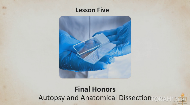 1:13:46
1:13:46
5. Autopsy and Anatomical Diessection (1:13:46)
SANCTITY IN DEATH Autopsy and Medical Dissection Many states allow medical schools to use unclaimed cadavers for anatomical dissection
Series: Life in the Balance
Rabbi Shraga Sherman (137)
-
 1:17:20
1:17:20
4. Compensation for Organ Donation (1:17:20)
CONFRONTING THE ORGAN SHORTAGE Should the Sale of Organs Be Legal? Permitting the sale of organs may significantly increase the number of organs available for transplant, potentially saving many thousands of lives
Series: Life in the Balance
Rabbi Shraga Sherman (137)
-
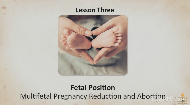 1:06:35
1:06:35
3. Fetal Position (1:06:35)
COMPLICATIONS IN PREGNANCY Aborting One Life to Save Another Couples undergoing fertility treatment are often advised to reduce the number of fetuses in order to save a high-risk pregnancy
Series: Life in the Balance
Rabbi Shraga Sherman (137)
-
 57:23
57:23
Confronting Moral Dilemmas amid a Pandemic (57:23)
The recent Ebola outbreak raised questions as ancient as pandemics themselves. In 1918 an influenza virus caused a pandemic that killed an estimated twenty to forty million people in the course of a single year
Dr. Jeffrey Taubenberger (1)
-
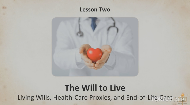 1:16:10
1:16:10
2. The Will to Live (1:16:10)
END-OF-LIFE DILEMMAS Prolonging Life vs. Prolonging Death Resuscitate? Do not resuscitate? How does one decide what to inscribe in their living will? The value of life is immeasurable, but is the same true for its increments? This lesson discusses the important end-of-life decisions that we need to make today, and offers Jewish perspectives on dying with dignity.
Series: Life in the Balance
Rabbi Shraga Sherman (137)
-
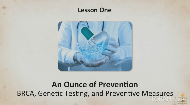 1:13:39
1:13:39
1. An Ounce of Prevention (1:13:39)
SAFEGUARDING OUR HEALTH BRCA, Genetic Testing, and Preventive Measures We all endeavor to protect our health, but we often question whether we do enough. Scientists have recently identified the BRCA genetic mutations (common in Ashkenazi Jews) that significantly increase the risk of breast and ovarian cancers
Series: Life in the Balance
Rabbi Shraga Sherman (137)
-
 52:46
52:46
How Advances in Medicine Affect the Performance of a Mitzvah (52:46)
The Redemption of the Firstborn traces its origin to the times of the Torah, and this important mitzvah remains faithfully observed to this day. With advances in medicine in the 21st century, a number of new questions have arisen as to how to apply and properly observe this mitzvah
Rabbi Dr. Edward Reichman (51)
-
 46:57
46:57
Brain Death and Organ Transplants (46:57)
To save a life is one of the greatest mitzvot that one can perform. At the same time, however, it is axiomatic that we cannot save a life by ending another. The time of death, then, becomes a subject of utmost importance
Rabbi Dr. Yitzchok Breitowitz (71)
-
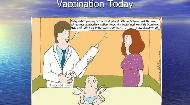 53:25
53:25
Issues and Controversies in Vaccination (53:25)
Vaccination is considered by many to be the most extraordinary advance in the history of medicine, having prevented an untold number of deaths since its discovery
Rabbi Dr. Edward Reichman (51)
-
 53:09
53:09
Medical Crossfire! (2015) (53:09)
The panelists will answer questions and address medically related ethical quandaries submitted by participants. No question is too basic or too complex. To see our other "Crossfire!" videos, click here. This panel took place at the 10th annual National Jewish Retreat. For more information and to register for the next retreat, visit: Jretreat.com.
Series: Crossfire!
Rabbi Dr. Edward Reichman (51)
-
 1:00:58
1:00:58
The Ethics of New Reproductive Possibilities (1:00:58)
A fifty-nine-year-old, British woman is staging a legal bid to become pregnant with her own grandchild. She and her husband claim it s their daughter s dying wish for her eggs to be fertilized by donor sperm and implanted in her mother despite potential health risks to the woman and unborn child
Rabbi Dr. Edward Reichman (51)
-
 54:56
54:56
Stem Cell Research and Cloning in Jewish Law (54:56)
Bio-technologies, like embryonic stem cell research and cloning, offer new, exciting possibilities for curing the toughest medical conditions. They also raise serious ethical questions
Rabbi Dr. Yitzchok Breitowitz (71)
-
 17:15
17:15
The Jewish Perspective On Malpractice (17:15)
Are doctors being unfairly targeted with malpractice lawsuits? Rabbi Dr. Edward Reichman will discuss Jewish law’s perspective on the accountability of doctors as healers in their communities. This lecture took place at the 9th annual National Jewish Retreat. For more information and to register for the next retreat, visit: Jretreat.com.
Rabbi Dr. Edward Reichman (51)
-
 1:03:49
1:03:49
Medical Crossfire! (2014) (1:03:49)
The panelists will answer questions and address medically related ethical quandaries submitted by participants. No question is too basic or too complex. To see our other "Crossfire!" videos, click here. This session was featured at the 9th annual National Jewish Retreat. For more information and to register for the next retreat, visit: Jretreat.com.
Series: Crossfire!
Rabbi Dr. Edward Reichman (51)
-
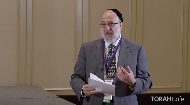 46:01
46:01
The Case of Cloning (46:01)
New technologies raise new ethical questions that require guidance. Every ethical system evaluates technological advances against the criteria of its moral code. In Jewish tradition, that touchstone is halachah, the corpus of Jewish law and ethics
Professor Steven Resnicoff (4)
-
 53:22
53:22
Where Medicine Differs (53:22)
Rapidly evolving social philosophies and ethical trends have a significant impact on the way doctors practice. Ethical standards appear to be flexible and a reflection of the mores of the times. Nonetheless, a common perception persists, that medicine is grounded in timeless, lofty values consistent with high moral purpose
Rabbi Dr. Yaakov Brawer (6)
-
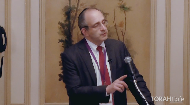 41:32
41:32
A Heart Quandary (41:32)
Millions of Americans are walking around with implanted pacemakers and defibrillators. When should these devices be deactivated to allow nature to take its course? This session addresses this important question from the perspective of Jewish ethics and sheds light on similar end-of-life medical quandaries. This lecture took place at the 9th annual National Jewish Retreat
Dr. Alan Kadish (2)
-
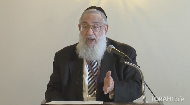 48:23
48:23
Pro-Life or Pro-Choice? (48:23)
In this session abortion will be addressed, one of the most polarizing issues in contemporary discourse, from the perspective of Jewish law and ethics. Does a woman always have the right to terminate her pregnancy? Or does life begin at conception, and destroying a fetus tantamount to murder? This lecture was delivered at the 9th annual National Jewish Retreat
Rabbi Tzvi Flaum (4)
-
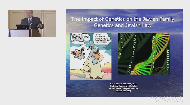 54:52
54:52
Genetics and the Jewish Family (54:52)
Of all the medical advances in the 21st century few have impacted the Jewish community more than the field of genetics. From adult carrier testing to fetal testing, to the incorporation of DNA testing into Jewish law, to pre-implantation genetic diagnosis, this session will explore the modern world of genetics from a Jewish perspective.
Rabbi Dr. Edward Reichman (51)
-
 42:47
42:47
The Stem Cell Debate (42:47)
Breakthroughs in stem cell research have caused much excitement about the vast potential of using embryonic stem cells to cure various diseases. But what are the moral implications of destroying these embryos in the process? What is the Jewish view? Should an embryo in a Petri dish be considered a life? This lecture took place at the 9th annual National Jewish Retreat
Dr. Alan Kadish (2)
-
 40:20
40:20
Final Moments: End-of-Life Decisions and Jewish Law (40:20)
The value of life is immeasurable, but is the same true for its increments? Are the medical advances some see as life-supporting in fact simply death-prolonging? This session discusses important end-of-life decisions many families face today, and offers the Jewish perspectives on dying with dignity. This lecture took place at the 9th annual National Jewish Retreat
Rabbi Tzvi Flaum (4)
-
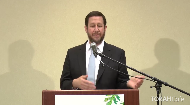 57:49
57:49
Whose Life Is It, Anyway? (57:49)
In 1979, conjoined twins were born to a Jewish family in the United States. The drama that followed shocked doctors, challenged the leading halachic minds of the time and ultimately involved the Supreme Court. This talk will give a fascinating insight into Judaism’s approach to some of the hot topics of modern-day moral dilemmas
Rabbi Yitzchak Schochet (186)
-
 55:50
55:50
Oncofertility: Finding Hope in the Midst of Tragedy (55:50)
For many cancer survivors their medical nightmare doesn’t end when they finish treatment. Sometimes the chemotherapy or the disease itself can render them infertile. Oncofertility is the cutting edge medical research that aims to preserve the reproductive ability of cancer patients. This lecture explains the medicine behind the miracle and the ethical questions involved
Rabbi Dr. Edward Reichman (51)
-
 57:03
57:03
Medical Utopias of the Future (57:03)
What does Judaism have to say about the elimination of disease, the reversing of aging, and prospects for human immortality? This workshop examines recent medical breakthroughs in genetic engineering, stem cell research, and nanotechnology in the context of classical Jewish sources. This lecture was delivered at the 8th annual National Jewish Retreat
Rabbi Asher Crispe (45)
-
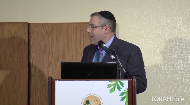 59:59
59:59
The Final Moment: Defining Death and Respecting Life (59:59)
What is the definition of death? Modern medicine still grapples with this question, challenged by medical advances that continually prolong life. In Jewish law, knowing when a patient has deceased is vital to understanding when treatment can be withdrawn, as well as other grave issues
Rabbi Dr. Edward Reichman (51)
-
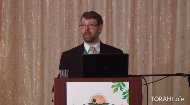 54:18
54:18
Medical Roulette and Experimental Treatments (54:18)
The rapid advances in medical science present exciting but unproven treatments. The desire to heal our loved ones must be balanced with the potential danger of these therapies. How do we make this choice? When is it worth the risk and when not? This lecture was delivered at the 8th annual National Jewish Retreat
Dr. Daniel Eisenberg (5)
-
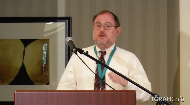 52:27
52:27
Abortion and Jewish Law: Understanding The Classical Sources (52:27)
Although it now inflames modern political debate, abortion has occupied Jewish legal writings for centuries. With both sensitivity and firmness, Jewish authorities have tackled some of the most difficult challenges of this agonizing procedure
Rabbi Dr. Michael Broyde (37)
-
 8:06
8:06
What is the definition of Maternity in the 21st Century (8:06)
Rabbi Dr. Edward Reichman (51)
-
 57:34
57:34
Who Lives, Who Dies, Who Decides (57:34)
Against the backdrop of Hurricane Katrina, doctors were forced to make some of the toughest decisions a physician could ever face. This discussion of events at Memorial Hospital in New Orleans as witnessed by Dr
Dr. Daniel Eisenberg (5)
-
 7:36
7:36
The Jahi McMath Case: The Legal Status of Brain Death (7:36)
Rabbi Dr. Edward Reichman (51)
-
 7:07
7:07
Non-Vital Organ Transplant (7:07)
In this second segment of the Jewish medical ethics series, Rabbi Edward Reichman, M.D. speaks about recent developments in the field of medical transplantation discussing some of the halachic concerns involving proceduresthat improve lives but are not life-saving. How should a donor balance his level of risk with his responsibility to “not stand idly by?”.
Rabbi Dr. Edward Reichman (51)
-
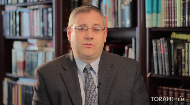 8:46
8:46
The Ariel Sharon Case - The Halachic Status of a Comatose Patient (8:46)
We are pleased to introduce a new series on medical ethics by Rabbi Eddie Reichman, M.D., Professor of Emergency Medicine and Professor of Education and Bioethics at the Albert Einstein College of Medicine of Yeshiva University. In this series, Rabbi Dr. Reichman will analyze new and emerging medical technologies and related ethical issues. In this installment, Rabbi Dr
Rabbi Dr. Edward Reichman (51)
-
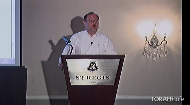 33:38
33:38
Brain Transplants: Are You What You Think? (33:38)
Rabbi Dr. Michael Broyde (37)
-
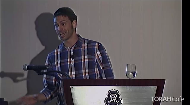 47:25
47:25
A Jewish View on Mental Disorders (47:25)
Rabbi Ira Bedzow (4)
-
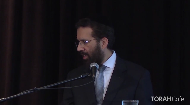 22:30
22:30
Etiquette in the World of the Sick (22:30)
When we hear about a friend being diagnosed with a serious illness, we often feel at a loss and wonder what we can say or do to help our friend. How can we help them feel supported and not, G-d forbid, say the wrong thing? This session at the NJR, led by Dr
Dr. Michael Akerman (3)
-
 59:26
59:26
Why We Need Jewish Medical Ethics (59:26)
Can’t we police ourselves? If our intentions are good, isn’t it enough to do what we think is best when faced with a difficult decision? What do Jewish ethical guidelines add to the discussion, and what if we don’t agree?.
Dr. Daniel Eisenberg (5)
-
 52:51
52:51
Healthcare Reform: A Jewish Perspective (52:51)
President Obama’s overhaul of the healthcare system has set off a firestorm of debate. Is it society’s responsibility to provide healthcare to all? Can citizens be forced into something for their own good? This analysis of the Jewish view of healthcare reform outlines Judaism’s vision of a free and healthy society
Rabbi Dr. Michael Broyde (37)
-
 39:01
39:01
Organ Donation and Respecting the Deceased (39:01)
Dr. Daniel Eisenberg (5)
-
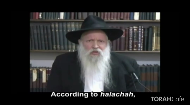 19:30
19:30
7 Principles for Physicians and Caregivers (19:30)
Which illnesses are G-d's realm and which are for the physician to heal? Rabbi Yitzchak Ginsburgh explains the parallels between the emotional spheres and 7 principles derived from the phrase "Heal and he shall heal” found in Parshat Mishpatim. To answer the question, all illness and all healing is from G-d.
Rabbi Yitzchak Ginsburgh (31)
-
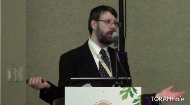 45:05
45:05
The Ethics of Genetic Screening (45:05)
Are we playing G-d by doing genetic screening? Dr. Daniel Eisenberg gives a simple description of what a carrier is, and then clarifies the ramifications of being a carrier of a recessive gene. He delves into the opinions of Torah sages on how to deal with this thorny topic. This lecture was delivered at the 7th annual National Jewish Retreat
Dr. Daniel Eisenberg (5)
-
 11:22
11:22
Human Cloning (11:22)
Is cloning playing G-d? Who is the father and mother, brother and sister? Professor Avraham Steinberg is well versed in cloning, the duplicating of a person, animal, or body part. What are the ethical, moral and religious ramifications of cloning?.
Professor Avraham Steinberg (7)
-
 1:00:11
1:00:11
Live and Let Die: Euthanasia (1:00:11)
A fascinating discussion of the Jewish view of assisted suicide.
Rabbi Berel Bell (151)
-
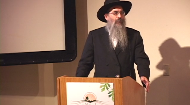 1:01:36
1:01:36
Hazardous Medical Procedures (1:01:36)
Oftentimes healers will recommend surgery or other high-risk procedures – with possibly fatal implications – as remedies for various ailments and conditions
Rabbi Berel Bell (151)
-
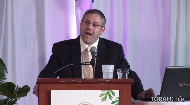 57:22
57:22
Jewish Medical Ethics Through the Eyes of Maimonides (57:22)
Join an expert in Jewish medical ethics, to discover what Maimonides has to say about preventative medicine, the separation of Siamese twins, stem cell research, end of life issues, and more. This lecture was delivered at the 6th annual National Jewish Retreat. For more information and to register for the next retreat, visit: Jretreat.com.
Rabbi Dr. Edward Reichman (51)
-
 1:05:28
1:05:28
Organ Donation (1:05:28)
Who decides the moment of death, how is it determined, and how does this determination affect us all? Rabbi Berel Bell, an expert on medical issues in Jewish law, gives a history of the determination of what is death and what is life
Rabbi Berel Bell (151)
-
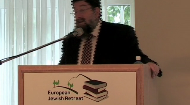 56:08
56:08
Compensating an Organ Donor (56:08)
Rabbi Dr. Mordechai Halperin (2)
-
 48:49
48:49
The Jewish Medical Student: A Historical Overview (48:49)
Edward Reichman has the unique perspective of being both an ordained rabbi and a doctor (at Montefiore Medical Center, in the Bronx, N.Y.). Throughout the centuries, Jewish medical practitioners have faced unique challenges ranging from the social and cultural to the halachic. This lecture was delivered at the 6th annual National Jewish Retreat
Rabbi Dr. Edward Reichman (51)
-
 57:56
57:56
Jewish Medical Ethics: Organ Donations (57:56)
Jodi Picoult’s fictional novel about a child born to provide life for her sick sister raises complex medical ethical dilemmas. Topics for discussion include pre-implantation genetic diagnosis, the savior sibling, living organ donation from minors and adults, and the definition of death. You do not need to have read the book to enjoy this lecture
Rabbi Dr. Edward Reichman (51)
-
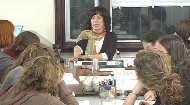 1:38:45
1:38:45
Rolling the Dice: Risky and Experimental Treatments - Part 3 (1:38:45)
Medicine and Morals: Your Jewish Guide Through Life's Tough Decisions Lesson 3 Rolling the Dice: Risky and Experimental Treatments Often, people with rare or incurable illnesses consider untested experimental treatment, gambling that they will be cured
Series: Medicine and Morals
Mrs. Shimona Tzukernik (121)
-
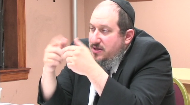 59:43
59:43
Halacha in the Medical Lab (59:43)
Journey of the Mind and Soul (JMS) is a women’s learning program created by Crown Heights women, for Crown Heights women. These courses are designed to take students out of the box of traditional learning, to engage in familiar texts in new ways. For more information about JMS and to get involved, check out journeyofmindandsoul.wordpress.com.
Rabbi Yisroel Fried (4)
-
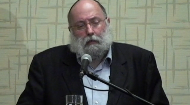 6:12
6:12
End of Life Challenges (6:12)
A gloves-off, no-holds-barred discussion of all the burning questions you may have about sexuality, cremation, abortion, and other controversial issues, as seen through the lens of Jewish psychology and mystical insight.
Rabbi Simon Jacobson (149)
-
 16:08
16:08
Monitoring Our Students' Mental Health (16:08)
In this lecture addressed to aspiring teachers, Dr. Samuel Klagsbrun, child psychiatrist, discusses compassionate and pragmatic methods for evaluating the mental health of potentially troubled students. This lecture was coordinated by the Menachem Education Foundation, for more information visit; mymef.org.
Dr. Samuel Klagsbrun (1)
-
 5:24
5:24
Labriyut - To Your Health, Episode Six (5:24)
Series: Labriyut - To Your Health
Mrs. Molly Resnick (20)
-
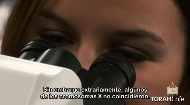 2:39
2:39
Medicina y Moral - Lección Seis (2:39)
-
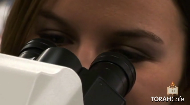 2:39
2:39
Secret Code (2:39)
Medicine and Morals: Your Jewish Guide Through Life's Tough Decisions Medicine and Morals is your chance to get real with the subject of medical ethics, discuss actual case histories, and get a sense of direction to weather the toughest challenges you’ll ever face
Series: Medicine and Morals
-
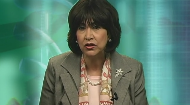 5:05
5:05
Labriyut - To Your Health, Episode Five (5:05)
Series: Labriyut - To Your Health
Dr. David Pelcovitz (7)
-
 3:10
3:10
Medicina y Moral - Lección Cinco (3:10)
-
 5:17
5:17
Labriyut - To Your Health, Episode One (5:17)
**Please note: The controversial issue of vaccination is addressed in Lesson One of the Rohr Jewish Learning Institute's course, Medicine & Morals. This video is intended simply to reflect the content of that lesson. This video is not intended to express the views or opinions of Torah Cafe, the Rohr Jewish Learning Institute
Series: Labriyut - To Your Health
Mrs. Molly Resnick (20)
-
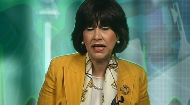 6:01
6:01
Labriyut - To Your Health, Episode Four (6:01)
Series: Labriyut - To Your Health
Mrs. Molly Resnick (20)
-
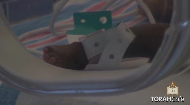 2:49
2:49
New Beginnings (2:49)
Medicine and Morals: Your Jewish Guide Through Life's Tough Decisions Medicine and Morals is your chance to get real with the subject of medical ethics, discuss actual case histories, and get a sense of direction to weather the toughest challenges you’ll ever face
Series: Medicine and Morals
-
 2:49
2:49
Medicina y Moral - Lección cuatro (2:49)
-
 3:33
3:33
Medicina y Moral - Lección Tres (3:33)
-
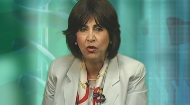 6:05
6:05
Labriyut - To Your Health, Episode Three (6:05)
Series: Labriyut - To Your Health
Mrs. Molly Resnick (20)
-
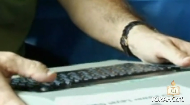 3:13
3:13
Rolling the Dice (3:13)
Medicine and Morals: Your Jewish Guide Through Life's Tough Decisions Medicine and Morals is your chance to get real with the subject of medical ethics, discuss actual case histories, and get a sense of direction to weather the toughest challenges you’ll ever face
Series: Medicine and Morals
-
 5:47
5:47
Labriyut - To Your Health, Episode Two (5:47)
Medicine and Morals: Your Jewish Guide Through Life's Tough Decisions - A man wonders if his dying father should remain on life support. What would you do? - A parent wonders if they should tell their child he has a potentially serious genetic disorder
Series: Labriyut - To Your Health
Mrs. Molly Resnick (20)
-
 3:43
3:43
Flesh of My Flesh (3:43)
Medicine and Morals: Your Jewish Guide Through Life's Tough Decisions Medicine and Morals is your chance to get real with the subject of medical ethics, discuss actual case histories, and get a sense of direction to weather the toughest challenges you’ll ever face
Series: Medicine and Morals
-
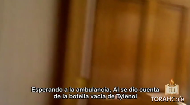 3:43
3:43
Medicina y Moral - Lección De Dos (Spanish) (3:43)
-
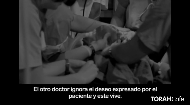 1:43
1:43
Medicina y Moral - Lección uno (Spanish) (1:43)
-
 1:50
1:50
Choosing Life (1:50)
Medicine and Morals: Your Jewish Guide Through Life's Tough Decisions Medicine and Morals is your chance to get real with the subject of medical ethics, discuss actual case histories, and get a sense of direction to weather the toughest challenges you’ll ever face
Series: Medicine and Morals
-
 2:16
2:16
Medicina y Moral: Su Guía Judía para afrontar las difíciles decisiones de la vida (2:16)
-
 2:11
2:11
Medicine and Morals Promo: Your Jewish Guide Through Life's Tough Decisions (2:11)
A new 6-week course from The Rohr Jewish Learning Institute. Begins the week of October 24, 2010. Register today! For more information, to find a location near you, and to register, please visit www.myJLI.com.
-
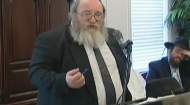 31:29
31:29
Medical Ethics - An Overview (31:29)
Rabbi Dr. Yitzchok Breitowitz (71)


